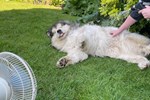Search - VetCompass
61 - 70 of 74 results
-
New research highlights dog breeds at most risk of hypothyroidism
A new study from the Royal Veterinary College explores the frequency and risk factors for hypothyroidism in dogs in the UK, promoting greater awareness with earlier detection and treatment New research the Royal Veterinary College (RVC) has shed … -
The cat’s out the bag: the most common diseases in pet cats revealed
Gum and dental disease, obesity, overgrown nails and flea infestation reported by the RVC as the top disorders in cats, with risks varying by age and sex. New research from the Royal Veterinary College (RVC) reveals the most common disorders … -
The UK’s largest ever feline dental disease study identifies age and breed as biggest risk factors
New research from the Royal Veterinary College (RVC) has shed light on the frequency, risk factors and linked health problems associated with periodontal disease in pet cats in the UK. These findings will help veterinary practitioners and owners … -
English Cocker Spaniels – a fairly typical, but potentially moody, dog
A new study from the Royal Veterinary College illuminates the most common disorders in English Cocker Spaniels in the UK, aiding owners to know what to expect if they get this breed New research from the Royal Veterinary College (RVC) has found … -
The RVC urges owners of hot dogs to “cool first, transport second”
A new study by the VetCompass team at the Royal Veterinary College (RVC) has found that dogs with heatstroke may be suffering even further due to outdated first aid practices. The research calls for updated guidance to be promoted more widely for … -
Misbehaving dogs die young
New pioneering research conducted by the VetCompass™ Programme at the Royal Veterinary College (RVC) reveals that dogs with undesirable behaviours, such as aggression, running away, fighting, over-excitability or barking, are more likely to die at a younger age. Undesirable behaviours may reflect poor training by owners or even undiagnosed medical conditions, for example dogs that urinate indoors may be suffering from unidentified bladder infections. -
Gastric bloat: 80% survival of surgical cases shown in VetCompass study
An RVC-led epidemiological study involving dogs from across the UK has blown the myth that gastric bloat is almost always a death sentence for affected dogs. -
New RVC research reveals antibiotics offer no benefit in treating dogs with diarrhoea
A new VetCompass study from the Royal Veterinary College (RVC) has revealed that veterinary prescription of antibiotics at first presentation of uncomplicated diarrhoea in dogs causes no difference in clinical resolution of these cases. The study … -
The RVC collaborates on new veterinary Endocrinology App for Dogs
The Royal Veterinary College’s (RVC) data and analytics has supported Dechra Veterinary Products to create a research-informed app - the first of its kind - which helps vets better diagnose and treat disorders that affect the glands producing … -
New research confirms extreme welfare issues in Shar Pei, the sandpaper skin dog breed
New research from the Royal Veterinary College (RVC) has found that in-turned eyelids and ear disorders are the most common health conditions in Shar Pei dogs in the UK; both resulting from the breed’s characteristic loose, thickened and folded skin. …










